 United Pet Group has expanded their voluntary recall of several popular vitamins and nutritional supplements this week due to the possibility of Salmonella contamination. Several Pro-pet and Excel line tablets are included in the recall. For a complete listing of products and lots affected by the recall click here. Though there have been no confirmed cases of illness, the company is recalling the products as a precaution. If you currently administer a vitamin supplement to your pet, please take a moment to read over the recalled product listing/press release to be sure the products you may have are safe to handle and administer.
United Pet Group has expanded their voluntary recall of several popular vitamins and nutritional supplements this week due to the possibility of Salmonella contamination. Several Pro-pet and Excel line tablets are included in the recall. For a complete listing of products and lots affected by the recall click here. Though there have been no confirmed cases of illness, the company is recalling the products as a precaution. If you currently administer a vitamin supplement to your pet, please take a moment to read over the recalled product listing/press release to be sure the products you may have are safe to handle and administer.
Exotic Pet Possibilities – Part 1 – Flying Squirrels
 An amazing array of unusual small mammals have long been bred in captivity and sold within a rather small circle of exotic pet enthusiasts. Some, such as Fennec Foxes and Bennett’s Wallabies, are suitable only for well-experienced keepers with ample room and resources while others, including Servals and Coatimundis, can be downright dangerous and are best enjoyed in zoos or the wild. Today I’d like to introduce an animal that, while not suitable as a “first-time pet”, is a great choice for experienced hobbyists looking to expand their pet-keeping horizons. I’ll cover captive care in greater detail in future articles and move on to Sugar Gliders, Degus, Hedgehogs and Spiny Mice in Part 2.
An amazing array of unusual small mammals have long been bred in captivity and sold within a rather small circle of exotic pet enthusiasts. Some, such as Fennec Foxes and Bennett’s Wallabies, are suitable only for well-experienced keepers with ample room and resources while others, including Servals and Coatimundis, can be downright dangerous and are best enjoyed in zoos or the wild. Today I’d like to introduce an animal that, while not suitable as a “first-time pet”, is a great choice for experienced hobbyists looking to expand their pet-keeping horizons. I’ll cover captive care in greater detail in future articles and move on to Sugar Gliders, Degus, Hedgehogs and Spiny Mice in Part 2.
Note: Be sure to check your state’s laws regarding exotic pets…please write in if you need help in locating this information.
It is imperative that you locate an experienced exotic mammal veterinarian before deciding to keep any of the animals mentioned below. You should also consult with your family doctor regarding any potential health hazards. Read More »
July 4th Fun & Fireworks – Pet Anxiety & Safety Tips
The July 4th Holiday is upon us, and unfortunately it is one of the busiest times for animal shelters due to the overwhelming amount of dogs lost during the fireworks & festivities. The fireworks may be fun for us, for some of our canine friends it can be downright terrifying.
During fireworks displays, or even while setting off fireworks in your backyard and neighborhood, your usually calm family pet may become extremely stressed. The stress overload can cause some pets to try to escape the house or yard. By following a few simple tips for this holiday weekend you can avoid coming home to an empty house and the anxiety of a missing beloved family pet.
- Avoid bringing your pet to fireworks displays, even if they are not usually startled by loud noises or thunder.
- Keep your pet indoors in a quiet, safe, sheltered area. Keep doors and windows closed and locked (I’ve heard stories of dogs opening slider doors or even jumping through windows to escape). Leave the TV on or play soothing music at a normal level to distract him from the noise outside
- Prepare a safe “den” for your pet. If they choose to hide under the bed, in their crate or somewhere else in the house, allow them to. If your dog is not crate trained, and you would like him to be please visit our comprehensive crate training guide.
- Feed your pet before the displays begin and keep a special chew treat on hand as a distraction.
- Nervous or stressed dogs may chew to ease anxiety. Make sure to provide proper chew toys and make sure all cords and other dangerous objects are out of reach
- Try a calming aid to help calm anxiety, or ask your vet for medication to help with your pet’s noise phobia.
- Do not leave your pet outside during the festivities. Even with a fence or a tie-out a dog can go to great lengths to escape the source of their anxiety.
- Always make sure your pet is wearing a properly fitted dog collar with up-to-date ID tags. Consider having your pet microchipped for extra security.
- Try not to reward anxiety with extra attention. It may be hard not to cuddle or fawn over your pet when he is scared, but do your best to ignore axious behavior or practice distraction techniques to turn their focus away from commotions.
Follow these simple steps to enjoy a worry free Independence Day. The knowledge that your family pets are safe and sound will make your holiday all the more fun. Have a great holiday weekend!
Severe Weather can also be very stressful on our pets. Check out this post for tips on keeping you pets calm during severe weather.
Feral Ferrets – Domestic Ferrets Gone Wild!
The domestic ferret did not originally exist as a distinct species, but rather was produced via selective breeding of its wild relative, the European polecat (Mustela putorius). Please see our article Ferret Facts for more information on the ferret’s surprising history.
Despite centuries of domestication, ferrets retain many of their wild ancestors’ instincts. In the following article, we’ll take a look at the “wild side” of ferret life.
Domestic Ferrets in the Wild
Both ferrets and polecats have been released in New Zealand (1879-1886) as a rabbit control measure. Today a huge population of ferret-polecat hybrids occupies the island. Along with introduced stoats (a Eurasian ferret relative) and weasels, they have decimated populations of several flightless birds…the rabbits remain relatively unphased! Read More »
Animal Cruelty and Abuse – Understanding the Law and Reporting Violators
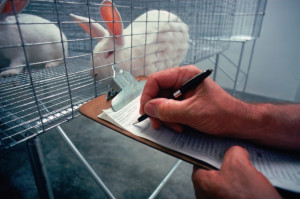 Despite the many people and groups involved in animal welfare and conservation, the sad fact is that animal abuse and neglect remains a serious problem USA. Unfortunately, the relevant laws are quite confusing and lack uniformity, and it is often difficult which agency is responsible for enforcing them. It is worthwhile, however, to learn as much as you can about how to proceed – most enforcement authorities are poorly staffed, and rely almost exclusively upon citizen complaints for leads.
Despite the many people and groups involved in animal welfare and conservation, the sad fact is that animal abuse and neglect remains a serious problem USA. Unfortunately, the relevant laws are quite confusing and lack uniformity, and it is often difficult which agency is responsible for enforcing them. It is worthwhile, however, to learn as much as you can about how to proceed – most enforcement authorities are poorly staffed, and rely almost exclusively upon citizen complaints for leads.
State and Federal Laws
Animal abuse is a crime in all 50 states, and almost all aspects of the problem are controlled by state law. The only areas covered by a federal law (the Animal Welfare Act) are commercial animal breeding facilities, zoos, circuses and research labs.
Details, such as what constitutes abuse or neglect and how the laws are actually enforced, vary from state to state. In some states, various types of illegal situations (i.e. dog-fighting, neglect in pet stores, abused animals in private residences) are handled by different law-enforcement agencies. Read More »
Choosing the Perfect Small Pet – Take the Quiz
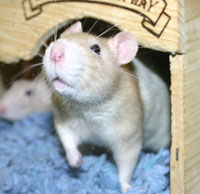 Sometimes it is hard to find the perfect pet. They all look so cute sleeping in their hammocks, running in their wheels, or just snuggling with pals. So which critter should you take home from the pet store? The questions in this short fun quiz should help give you an idea of your small pet personality match, but remember to do additional research before making the final decision! You’ll find the best pets to suit your lifestyle in the answers section below.
Sometimes it is hard to find the perfect pet. They all look so cute sleeping in their hammocks, running in their wheels, or just snuggling with pals. So which critter should you take home from the pet store? The questions in this short fun quiz should help give you an idea of your small pet personality match, but remember to do additional research before making the final decision! You’ll find the best pets to suit your lifestyle in the answers section below.
1.) During my days off, you can often find me ____.
a.) Hanging out at home – whether it’s to finish the laundry or catch up on all my recorded shows!
b.) Away on a mini vacation with the family. See you Monday!
c.) Having a bunch of friends over for a cook-out. The more the merrier!
2.) How much time do I want to spend grooming my pet?
a.) As little time as possible
b.) I don’t mind a little brushing here and there
c.) I could start my own pet salon with the time I will spend grooming!
3.) How many animals do I want?
a.) Just one will do
b.) A pair of pals
c.) A whole family!
4.) I will get around to cleaning my pet’s cage ____ times a week.
a.) 1-2
b.) 2-3
c.) 5-7
5.) I prefer to _____ my pet!
a.) Cuddle with
b.) Play with
c.) Just watch
d.) Do a little of everything
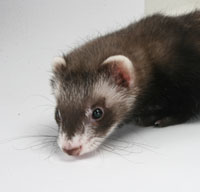 Answers
Answers
Question 1
a.) If you’re home a lot, you can spend a lot of time playing with or just watching your pets play outside the confines of their cages. Think about ferrets, guinea pigs, rabbits, or rats. These animals love interacting with their owners!
b.) If you prefer to spend as much time away from home as possible, a highly social or active animal may not be a good choice. Think about hamsters, gerbils, or chinchillas. These little guys do well without a lot of handling, but always be sure there is plenty of food and water.
c.) Have a big family or like to have lots of parties? Think about animals that are not bothered by a lot of noise and are not spooked by kids and strangers. The social ferret will want to join in the festivities while sensitive critters like rabbits and guinea pigs won’t appreciate a lot of ruckus! Then again, keeping the pet’s cage in a private room where guests or unattended children will not be entering works well for any small pet.
Question 2
a.) Hamsters, gerbils, rats, and mice are very good at keeping themselves clean, so you will not need to brush or bathe them. They also generally will not need their nails clipped since they spend a lot of time wearing them down by digging. You can, however, offer a dust bath once and a while to hamsters and gerbils now and then!
b.) If you don’t mind the occasional grooming session, most short haired rabbits and guinea pigs will need to be brushed once a week or so to remove dead hair and knots. However, if your breed of guinea pig or rabbit has long hair, you will need to do this more often. Chinchillas need no more than a roll in the dust once or twice a week to keep clean. Rabbits and guinea pigs usually need a nail trimming once a month.
c.) If you love nothing more than pampering your pet, a long haired breed of guinea pig or rabbit will require daily brushing to keep knots from building up as well as monthly nail trimming. Ferrets will need to have their ears cleaned and nails clipped once every two weeks, and can be bathed once a month if their body oil buildup becomes too smelly to handle.
Question 3
a.) Animals that do well housed alone include hamsters, chinchillas, and rabbits, but remember they will still need attention from you and plenty of toys and activities to keep busy.
b.) Chinchillas, gerbils, mice, rabbits, and guinea pigs do well in pairs but remember to get two of the same sex animal or have your animals spayed or neutered before introducing them to prevent unwanted litters. It is usually a good idea to buy pairs of animals at the same time so they can grow up already accustomed to each other.
c.) Gerbils love company! In the wild they live in small groups dominated by one female. If you opt for gerbils, think about getting males as they do not fight for dominance as much as females do. Guinea pigs also live in groups, but females tend to get along better than males do. Rabbits in the wild will live in groups until the breeding season, when the males will fight for mating rights and the females will fight for nesting areas. If you keep bunnies, be sure to spay and neuter them to eliminate these behaviors. Rats and mice live in huge colonies together in the wild, and as long as there is ample food and space, should get along well in groups at home.
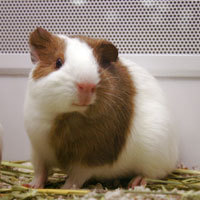 Question 4
Question 4
a.) Small rodents, like hamsters, mice, gerbils, and rats are clean and generally do not need to have their cage totally cleaned more than once or twice a week. Remember, the more animals you keep, the more they will need their cage cleaned.
b.) Guinea pigs, rabbits, and chinchillas have constantly moving digestive systems, so you can imagine the amount of poop they make in a week! If you scoop or dump their cage pans every few days and scrub the entire thing once a week, smells and bacteria will not take over your life.
c.) Ferrets are known for being messy, and they poop a LOT. Once you get them trained, their litter pans will need to be cleaned every day or every other day and the toys, towels, and hammocks will need thrown in the laundry or the smell from their body oils will build up. Along with their grooming, if you keep up on this chore it will become a trivial task, but put it off for too long and P.U.! No one wants to spend all day scrubbing cages. If you are diligent, you won’t have to!
Question 5
a.) You can’t get any cuddlier than a rabbit or guinea pig!
b.) Ferrets and rats will go crazy for playtime…literally!
c.) Hamsters, mice, chinchillas and gerbils can entertain themselves while you watch.
d.) There is a fourth category reserved here just for….everybody! Most animals will benefit from a bit of cuddling, a bit of playtime, and a bit of just being left alone, and it will depend on the personality of your individual animal. Remember that no animal perfectly fits the mold for what the general temperament is for its species. I’ve seen social hamsters and shy ferrets. I’ve seen solitary gerbils and mellow guinea pigs. Try out all of the above activities with your pet and see what he or she prefers. Read your pet’s body language and act accordingly, and do not be offended if your normally cuddly rabbit decides he doesn’t want to be picked up today. Just watch him for now. If your ferret is all tuckered out from playing, engage in a cuddle session! Whatever pet you choose, if you respect his or her boundaries, the relationship between you will flourish!
Ten Tips to Discourage Destructive Behavior in Dogs
 For those of you following this blog, you may have read some of my previous posts about Gatsby, my incredibly destructive, adopted German Shepherd mix. I’d like to share some of the techniques I used to help curb Gatsby’s destructive tendencies.
For those of you following this blog, you may have read some of my previous posts about Gatsby, my incredibly destructive, adopted German Shepherd mix. I’d like to share some of the techniques I used to help curb Gatsby’s destructive tendencies.
If you have a destructive pet, the first thing you have to do is find the root of the behavior. Does he have separation anxiety? Is he under-stimulated? Or maybe there was a recent change in routine or environment? All of these can be common triggers of destructive dog behavior. Your ‘treatment’ of the bad behavior will depend on the cause, and you may require some professional help if you are dealing with dangerous or extreme destruction in your home.
Read More »
Dog Friendly Vacation Destinations – the Mid-Atlantic
 Summer is swiftly approaching and many of our readers may be looking for dog-friendly vacation spots. Read on for a list (which is by no means is comprehensive) of pet friendly stops near Central PA. Whether you’re looking to spend a few days hiking the trails with your furry friend or just a day trip in the summer sun your family is bound to enjoy these fun summer destinations.
Summer is swiftly approaching and many of our readers may be looking for dog-friendly vacation spots. Read on for a list (which is by no means is comprehensive) of pet friendly stops near Central PA. Whether you’re looking to spend a few days hiking the trails with your furry friend or just a day trip in the summer sun your family is bound to enjoy these fun summer destinations.
Cape Henlopen State Park – Located on the Delaware seashore you can take Fluffy for a dip on non-lifeguarded beaches as long she is kept on a leash 6 ft or shorter. No dogs are permitted on the lifeguarded beaches, sailboarding beaches or shorebird nesting areas during peak season (May 1- September 30). Read More »
Balanced Diet – Feeding Guinea Pigs and Rabbits
As popular as these pets are, understanding the proper diet of our guinea pigs and rabbits is often cause for confusion, especially in first time owners. I thought it would be beneficial to compose a break down of the foods required of guinea pigs and rabbits for the overall health of these fuzzy little eating machines!
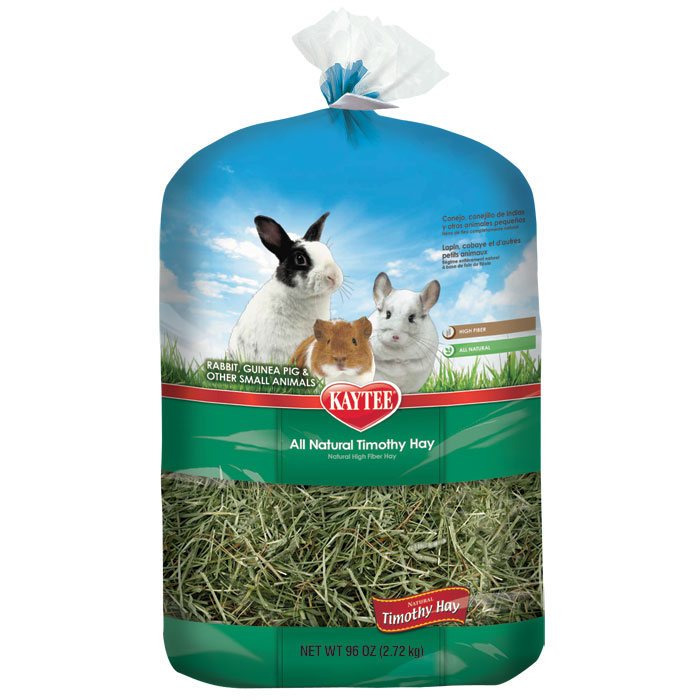 Hays and Grasses
Hays and Grasses
Pellets used to be the main (if not the only) food offered to guinea pigs and rabbits. Studies have shown however, that feeding only pellets can affect the health of the animal. Rabbits and guinea pigs are grazing animals that spend a lot of their day eating. So why aren’t they all round as watermelons? The grasses and shrubs that these animals feed on in the wild are very low in nutrition, so they must eat a lot of them to obtain the amount of nutrients needed each day. Since this grazing behavior is instinctive, our furry friends from the pet store continue to eat all day long just like their wild cousins, except captive animals are eating nutrient-concentrated pellets that can cause obesity if consumed in large amounts. This is why the main diet of any guinea pig or rabbit should be hay, primarily Timothy Hay, which is closest to what they would be feeding on in the wild. Large handfuls of hay every day will help keep your pet in grazing mode which will aid in alleviating boredom, wearing down teeth, and keeping the weight off. You can also occasionally offer Brome, Orchard Grass, Meadow Mix, and Alfalfa to mix things up. Fresh grasses from the yard are also OK (in small amounts) as long as the grass is collected from an area free of pesticides, runoff and pet waste. Be sure the picked grasses do not contain wild mushrooms or berries, and rinse it thoroughly before giving to your pets. Read More »
Litter Box Training for Newbies – The Basics
Most cat owners know the ins and outs of their cat’s litter box habits. When I got my first cat, I didn’t have a clue how to teach her to use the litter box. Here are some helpful hints and suggestions to jump start your litter box training and keep them from relieving themselves in your potted plants! Read More »
 That Pet Blog That Pet Place Pet Blog
That Pet Blog That Pet Place Pet Blog

